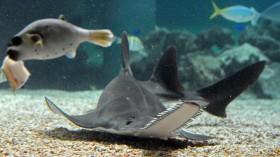A gene that was once helpful to ancient people living in the Arctic is today shown to be harmful to us, as researchers surprisingly found during a new study.
Thousands of years ago, a genetic variant arose that supposedly provided an evolutionary advantage for people living in the Arctic's harsh conditions. It allowed these individuals to process high-fat diets and survive in a cold environment. However, now the variant also seems to increase the risk of hypoglycemia, or low blood sugar, and infant mortality in today's northern populations.
The findings are described in the Cell Press's American Journal of Human Genetics.
This discovery provides an example of how an initially beneficial genetic change could be detrimental to future generations.
"Our work describes a case where the same variant has likely been selectively advantageous in the past [but] disadvantageous under current environmental conditions," senior author Dr. Toomas Kivisild, of the University of Cambridge in the UK, said in a press release.
Kivisild and his colleagues analyzed the genomes of 25 individuals from Northern Siberia and compared their sequences with those from 25 people from Europe and 11 from East Asia. From their analysis, researchers identified a gene called CPT1A that was unique to Northern Siberians. This gene encodes an enzyme involved in the digestion of long fatty acids, which are prevalent in meaty diets.
And since those people living in the extreme cold of the Arctic couldn't rely on agriculture, their diets consisted mostly of marine mammals that are high in fat.
The researchers then looked at the global distribution of the CPT1A variant, and found that it was present in 68 percent of individuals in the Northern Siberian population, yet absent in other publicly available genomes.
The variant has previously been linked to high infant mortality and hypoglycemia in Canadian Inuits, and researchers are still puzzled as to when and why the switch from helpful to harmful occurred.
© 2024 NatureWorldNews.com All rights reserved. Do not reproduce without permission.
![Severe Thunderstorm Alert: Tornadoes, Damaging Winds and Hail Possible from Upper Ohio Valley to Northeast US [NWS]](https://1471793142.rsc.cdn77.org/data/thumbs/full/70161/280/157/50/40/severe-thunderstorm-alert-tornadoes-damaging-winds-and-hail-possible-from-upper-ohio-valley-to-northeast-us-nws.jpg)




